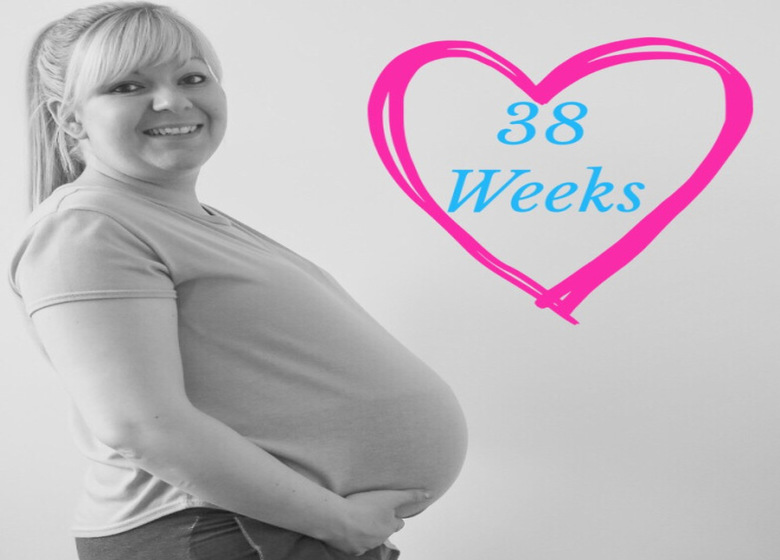38 Weeks Pregnant: What To Expect?
The baby is lowered into the pelvic region when the mother is at 38 weeks pregnant, where the baby could bump into various super-sensitive nerves. This will give both the mother’s legs and the vagina multiple sensations. Yes, during this period, the mother will go through different new experiences. The baby can be delivered at any time, and it’s best to try to relax until that time.
Baby’s Growth During Pregnancy – Week 38
The baby will be plumped up during week 38 of the pregnancy with a strong and firm grasp. The mother will be able to experience this for the very first time when she holds the hand of the baby after delivery. This week, all the baby’s organs will be fully developed. Ready to experience life outside the womb of the mothers. The baby continues to shed lanugo and vernix. The baby will swallow amniotic fluid. This will then accumulate in the intestine of the baby. Bile shed cells, and other waste products will also be in the intestine. This accumulation in the baby’s intestine will be the baby’s first once delivered bowel movement. Other changes are minor but quite important during week 38. The brain will continue to be fine-tuned, as will the baby’s nervous system.
Thinking about the baby’s eye color? If the baby is born with brown colored eyes, the color is likely to remain the same. Although, if the baby is born with dark blue or steel grey eyes, it is likely the color might stay blue or grey or could also turn hazel, green or brown by the age of 9 months. This is mainly because the irises of the baby may gain some pigment within the first few months after birth. The color mostly will get darker, but not lighter.
What is the Baby’s Size?
The length of the baby can be compared with the length of a leek. The pregnant baby’s weight of 38 weeks will exceed 19.5 inches and the baby weighs about 3 kg.
38-week Symptoms of Pregnancy
Common 38 weeks pregnant symptoms are all about being truly, truly pregnant. You are big; your baby is almost ready to arrive, and your body gets ready for the day of delivery. Here’s how it affects your body:
- Braxton Hicks Contractions. Contractions are to be expected at 38 weeks of pregnancy. You may have had these for weeks now, or you may just begin to notice what appears to be 38 weeks of pregnancy cramps or your belly tightening. If your contractions aren’t painful and go away when you switch positions, Braxton Hicks (a.k.a. “practice” contractions) are still there.
- Trouble Sleeping: You may feel anxious, or perhaps it’s all the pains and aches. But it’s hard to get a good night’s rest for someone so tired!
- Vaginal Discharge: This week you may start noticing globs of a thick, mucus-like substance. This yucky stuff is called the mucus plug and is completely normal in its presence. It is released in preparation for labor as your cervix dilates. Take heart; each piece of the mucus plug brings you so much closer to work!
- Itchy Belly: Your pregnant belly for 38 weeks is stretched practically as far as it can go, so it makes sense to be more sensitive. Hydration can help: you might want to switch to a heavy-duty moisturizer like pure shea butter at this point in your pregnancy and remember to drink plenty of water. What is not normal is a rash, so if you get one, let your OB know.
- Feet and ankles are swollen. You’re pregnant for 38 weeks, so you have the excuse to sit back and put your feet as humanely as you can. Nevertheless, take regular walks to keep your blood flowing and reduce swelling.
- Anxiety: Being so over pregnancy by the time you become pregnant for 38 weeks is normal. This feeling of getting ready. The one. Honey. Baby. Outside. Outside. If you have a significant amount of pregnancy weight, have a complicated pregnancy, or are pregnant with twins for 38 weeks, you maybe even stronger. Try to keep your mind busy with fun things. Go and watch a movie, have a special dinner with your partner, or have lunch with some friends. These are your last days or weeks before a newborn gets your attention, so you can enjoy them as much as you can.
38 WEEKS LABOR SIGNS
Signs of labor may start at 38 weeks of pregnancy. Some early signs that you will soon enter labor include:
- Mucus Plug and/or bloody show: You may have a discharge that is as thick as mucus (the plug of mucus) and may have a slightly bloody tinge (the bloody show). This is a sign that in preparation for birth your cervix is beginning to dilate.
- Nausea. The same goes for 38 weeks of pregnant nausea. It’s not a measurable sign of labor, but some women swear that they felt queasy just before work began.
- Diarrhea. Diarrhea may not be due to the spicy food you ate at 38 weeks of pregnancy, it may be a sign that labor hormones are present in your body. It may be time to go very quickly.
- Water Breaking: If you feel a water trickle, it means that the amniotic sac has broken down and the fluid leaks out. Labor usually begins pretty soon after the water breaks of a woman, so let your OB know if you get this pregnancy symptom for 38 weeks.
- Contractions. Contractions may be a normal part of your day at 38 weeks of pregnancy— or perhaps you haven’t noticed anything yet. But know that if your 38 weeks pregnant belly begins to tighten at regular intervals and does not stop, you are probably in the early stages of labor. Painful contractions or those closer than five minutes apart mean that you should get to the status of the hospital!
- Back Pain: You may have had back pain for weeks now, but at 38 weeks pregnant, back pain that is intense or sudden may actually be back pain, so let your doctor know if you’re having this 38 weeks pregnant symptom.
If you have a complication such as preeclampsia or gestational diabetes, uterine infection, or a placental problem, inducing labor may be medically necessary at 38 weeks of pregnancy. Otherwise, if you’re pregnant with twins for 38 weeks, or if you’re pregnant for 38 weeks, your doctor may say, “It’s time! “It can send any mother-to-be who thought she’d been in a panic for two more weeks. But now it’s going to be all right. We can never get 100% ready (well, maybe you’re one of the women who get it at week 42), and you and your child are good at the care of the OB and the pediatrician.
Keep in mind, at 38 weeks pregnant initiating labor normally isn’t suggested. Usually, the baby needs a bit more time inside — and some methods are not considered safe. So if you want to try to stimulate yourself to labor, first check with your doctor. Wait for your baby to be “full term” at least another week.
38 Weeks Ultrasound
A baby may already have about an inch of hair within your 38 weeks of a pregnant belly. Baby slowly shedding that white goo on the skin (remember, that stuff called vernix caseosa?) but at birth, you may see some of it.
Now you’re seeing the OB weekly, so this week you’re going to get an appointment. Your doctor will check that the baby is in a head-down position at these weekly appointments and see if the head is moving down into the pelvic chamber. Get ready for a pelvic examination where your cervix will be checked for dilation (opening) and dilution (dilution)—both signs your body is ready for work.
Unfortunately, when it comes to predicting dilation or erasure – based labor, there is no “normal”; if you started, it could be hours or weeks. But even if you’re not at all dilated, tomorrow you might still be able to go to work. Ah, childbirth’s unpredictability!
If your doctor wants a more thorough check on the baby, as part of a biophysical profile, she may order a 38 weeks pregnant ultrasound. Breathing, motion, muscle tone, heart rate, and amniotic fluid will be scored as part of the profile. In some cases, the biophysical profile result may cause your doctor to decide to deliver your baby earlier than your due date.
Also Read: 37 Weeks Pregnant: What To Expect?













